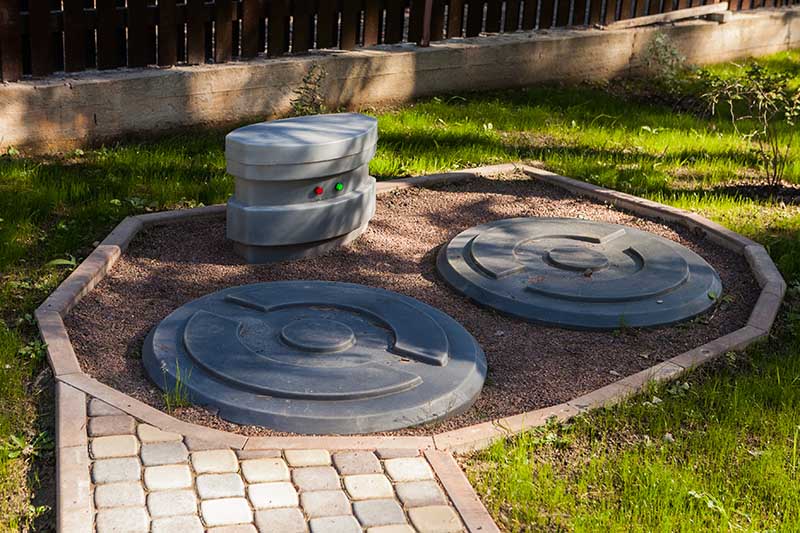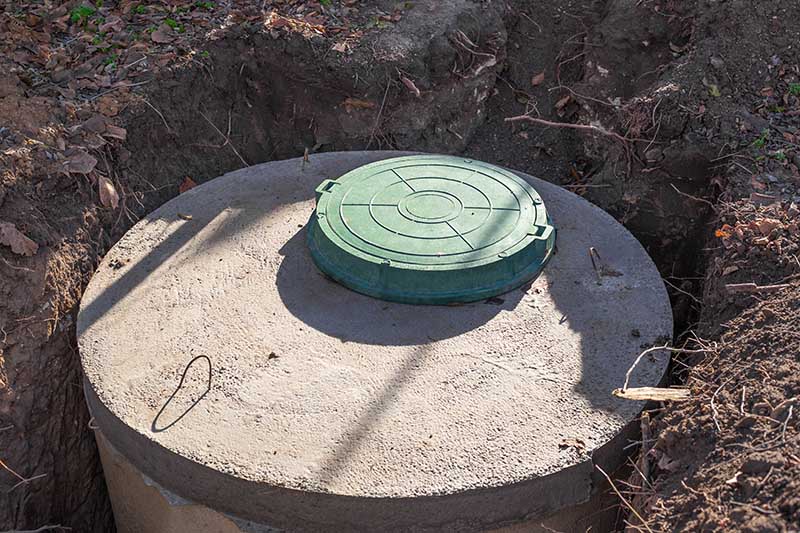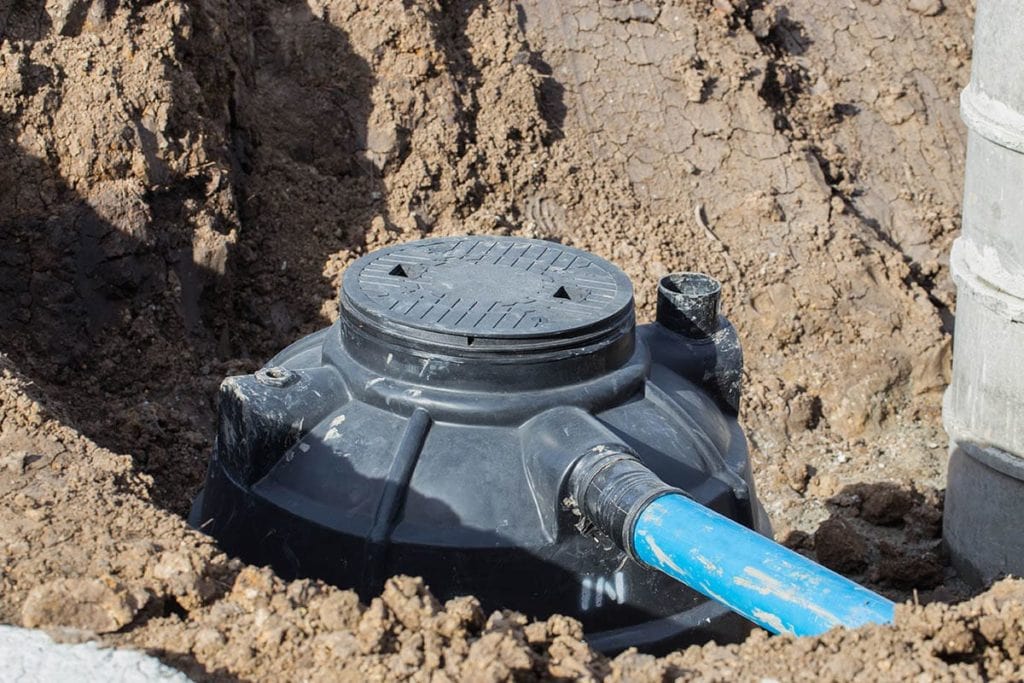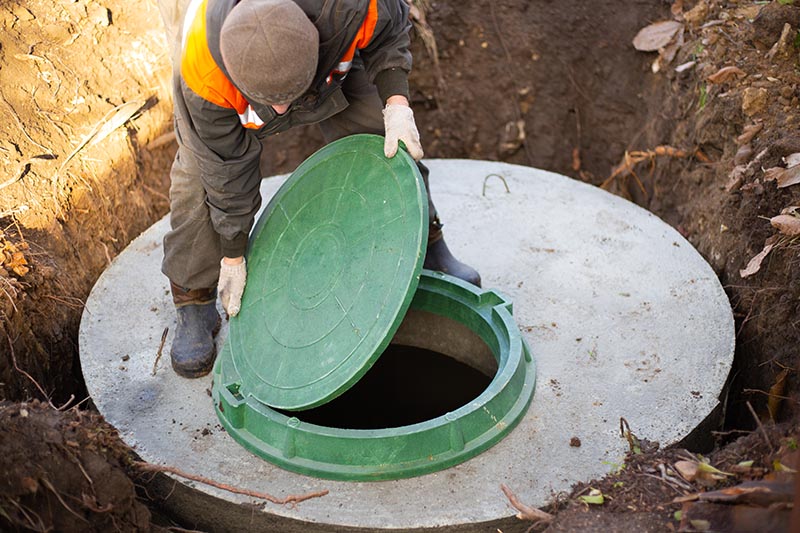Why Is My Septic Tank Alarm Going Off? (& What To Do)
-
Pete Ortiz
- Last updated:

Septic tank alarms are crucial components of any wastewater system. They are designed to monitor water levels and alert you if they are higher or lower than usual. Typically, the alarm horn, buzzer, or siren goes off when your septic tank’s health is in question. You could also receive “nuisance” alerts where the alarm goes off for no apparent problem.
So, what should you do if your alarm goes off?
Often, your septic tank alarm will not go off without good reason. Investigating and addressing the concern with the urgency it deserves is imperative. Ignoring the warning can lead to a catastrophe that can cost you thousands of dollars in repairs and clean-ups. Read on to learn why your septic tank alarm is going off and what to do.
Why Is My Septic Tank Alarm Going Off?
In the U.S., almost one-fifth of households don’t use public sewers. More than 21 million households use septic tanks instead to trap wastewater from household plumbing. Septic tanks separate waste into layers, where sludge and solid waste settle at the bottom, and liquid waste is discharged through pipes.
When your septic tank alarm goes off, this typically means that the water level is abnormally high. This happens when there is an imbalance in your septic tank’s health, increasing the risk of a wastewater overflow or backup into your home.
There are five main reasons why your septic tank alarm can go off.
1. Septic Tank Health Concerns
Complex biological processes occur within the septic tank, and microbes consume the sludge. This keeps the liquid waste balanced and prevents an overflow. However, issues like using harsh chemicals can upset the biological processes in your septic tank.
When there aren’t enough microbes to consume decent amounts of sludge, the liquid waste will be higher up in the tank than usual. The float sensor will trigger the alarm once the water level reaches a dangerous point.

2. Water Overuse
There are days when your household could produce considerably more wastewater. It could be you had guests over in your home or got too enthusiastic during laundry day. Whenever you produce more wastewater than you can flush out through pump cycles, your septic tank alarm will go off once it detects rising water levels.
3. Heavy Storms/Rain
Heavy rains or a storm can cause groundwater to seep into your septic tank. Also, if the drain field is oversaturated, it will not seep in more wastewater from the pump cycles. Any excess water in your septic tank will cause your alarm to go off. The best cause of action in this situation is to limit your wastewater production to prevent the problem from going from bad to worse.

4. Power Issues
Another crucial component of your septic system is the pump. It moves liquid waste from the septic tank into the drain field. If you have a septic grinder pump, it will also move solids like human waste and toilet paper into the leach field. Your pump needs a consistent power supply to work as intended.
A blackout can hinder the proper operations of your pump, leading to a rise in the effluent levels in your septic tank. If your alarm is going off, you may want to first confirm that your pump is receiving power.
5. Parts Failure
A septic tank has numerous mechanical components that are not immune to damage. For instance, your alarm could go off because of a faulty timer, pump, or float. Furthermore, a defective septic tank alarm can send nuisance alerts even when water levels in your tank are not too high or too low.
If you are receiving nuisance alerts, you need to seek the expertise of a skilled septic specialist. The expert will inspect your septic system and its components and recommend the best course of action.

 What Do I Do if My Septic Tank Alarm Is Going Off?
What Do I Do if My Septic Tank Alarm Is Going Off?
If rising water levels trigger your septic tank alarm, this doesn’t mean you have an emergency. You have at least 24 hours before the situation gets out of hand and you deal with an effluent overflow or backup. Still, it is imperative to deal with the problem with the urgency it deserves.
Here are the simple steps to take.
1. Turn off the Alarm
Depending on the septic tank alarm you have installed, it could send off an 85 to 120-decibel siren. The sound can be a nuisance, especially if you have an indoor alarm. It would be best to disarm the siren by locating the “silence” switch on the alarm box and flipping it to the “off” position.
2. Ensure the Alarm Remains Powered On
It’s easy to mistake the silence switch for the alarm “off” switch. To play safe, confirm that the alarm box still illuminates a constant green light. This indicates it is still powered on. If the green light turns red, your septic tank’s water levels are dangerously high.

3. Reduce Your Water Usage
Your septic tank pump can address rising water levels without needing to call a plumber. However, it takes about 10 hours for a functional pump to address the concern and flush excess water into the drain field.
Reducing water usage is necessary to ensure you don’t overwhelm the pump. Also, you may incur the expense of pumping out wastewater from your septic tank if you let it fill to the brim. Your septic specialist needs room to enter the tank, diagnose and fix the issue. Limiting your water usage can save you from additional expenses.
4. Call a Septic Expert
If your septic tank goes off, the water levels in your tank are higher than usual. Wait for your pump to do its job and if 10 hours go by and your alarm box is still illuminating a red light, call a septic specialist.
Final Thoughts
A septic system overflow or backup can be your worst nightmare. Fortunately, you don’t have to worry about a problem catching you off guard if you have a quality septic tank alarm in place. It will give you an early warning alert, ensuring you can address the flagged issue before things turn nasty.
Sometimes, an alert notifies you of a bigger problem that will not address itself, even if you have a functional pump. You can reduce the risk of septic emergencies by scheduling routine inspections and maintenance of your sewerage system.
See also:
Featured Image Credit: Artem Bruk, Shutterstock
Contents


 What Do I Do if My Septic Tank Alarm Is Going Off?
What Do I Do if My Septic Tank Alarm Is Going Off?